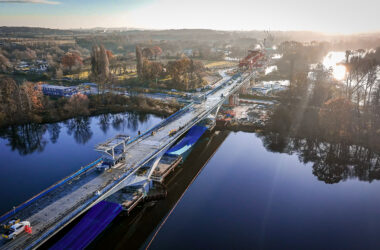Cheshire West & Chester Council has approved the development of the UK’s biggest low-carbon hydrogen production hub, led by EET Hydrogen.
The state-of-the-art facility will be constructed in two phases at the Stanlow Manufacturing Complex in Ellesmere Port, Cheshire, to enable the decarbonization of major regional industries.

It is comprised of two world-scale plants known as HPP1 and HPP2. The hydrogen hub is scheduled to commence operations in 2027. It will ultimately attain a generation capacity exceeding 4,000MW by 2030 – the largest in Britain.
The project forms a vital component of HyNet, the UK’s industrial decarbonization cluster, seeking to facilitate the transition from fossil fuels. It will provide manufacturers participating in the cluster access to cleanly produced hydrogen, allowing them to reduce carbon emissions drastically.
Decarbonizing Industries in the Northwest
The hydrogen supplied by EET Hydrogen will promote the establishment of the world’s first net-zero emission refining, glass, and chemical production facilities.
Local industrial consumers include the Essar Stanlow refinery and Tata Chemicals, Encirc and Pilkington. The availability of low-carbon hydrogen will equip these companies to evolve their processes in an environmentally sustainable manner.
The shift to hydrogen is projected to eliminate 2.5 million tonnes of carbon dioxide emissions every year – comparable to removing 1.1 million petrol cars off the road. This should positively impact regional decarbonization objectives that are progressively gaining momentum.
Phased Development Timeline
The EET Hydrogen hub will be developed in a staged approach, and construction is slated to commence in 2024.
The first phase encompasses a 350MW hydrogen production plant (HPP1), constituting the UK’s inaugural utility-scale low-carbon hydrogen facility. HPP1 alone will be capable of yielding enough hydrogen to replace 20% of natural gas consumed across the whole of Britain today.
The second phase involves an expansive 1,000MW plant (HPP2), while the overall complex is intended to achieve a capacity exceeding 4,000MW by the end of the decade.
The plants will incorporate carbon capture technology to store 97% of carbon underground offshore to ensure minimal carbon emissions.
Instrumental Role Supporting Decarbonization
EET Hydrogen’s commitment to broadening hydrogen infrastructure has been hailed as a watershed moment for the UK. The project stands at the forefront of Europe’s transition to sustainable energy.
Richard Holden, HPP1 Project Manager at EET Hydrogen, emphasized its unmatched scale and technology: “This is the largest low carbon hydrogen project in the UK and one of the most advanced in the world. It is a vital piece of the North West’s journey to net zero, underpinning HyNet and providing the opportunity for manufacturers in the region to decarbonize their processes and support UK jobs.”
Besides spurring regional hydrogen development, the initiative promises to generate employment and trigger investments worth billions of pounds in emerging low-carbon industries.
Realizing this new hydrogen production hub marks a key milestone for national decarbonization goals. As the UK continues to make strides in its commitment to reaching net zero, the EET Hydrogen project should empower entire industries to transition to sustainable production models.
TLDR:
- UK’s largest low carbon hydrogen production hub approved for Cheshire site
- EET Hydrogen leading £1bn+ project to build 4GW capacity by 2030
- Phased development: HPP1 350MW from 2027, HPP2 1000MW
- Provides hydrogen to HyNet decarbonization cluster participants
- Essar refinery, Tata Chemicals among manufacturers to use hydrogen
- Eliminates 2.5 million tonnes of CO2 yearly – like taking 1.1m cars off roads
- Enables the world’s first low-carbon refining and manufacturing facilities
- Vital for the UK’s journey to net zero emissions by 2050







